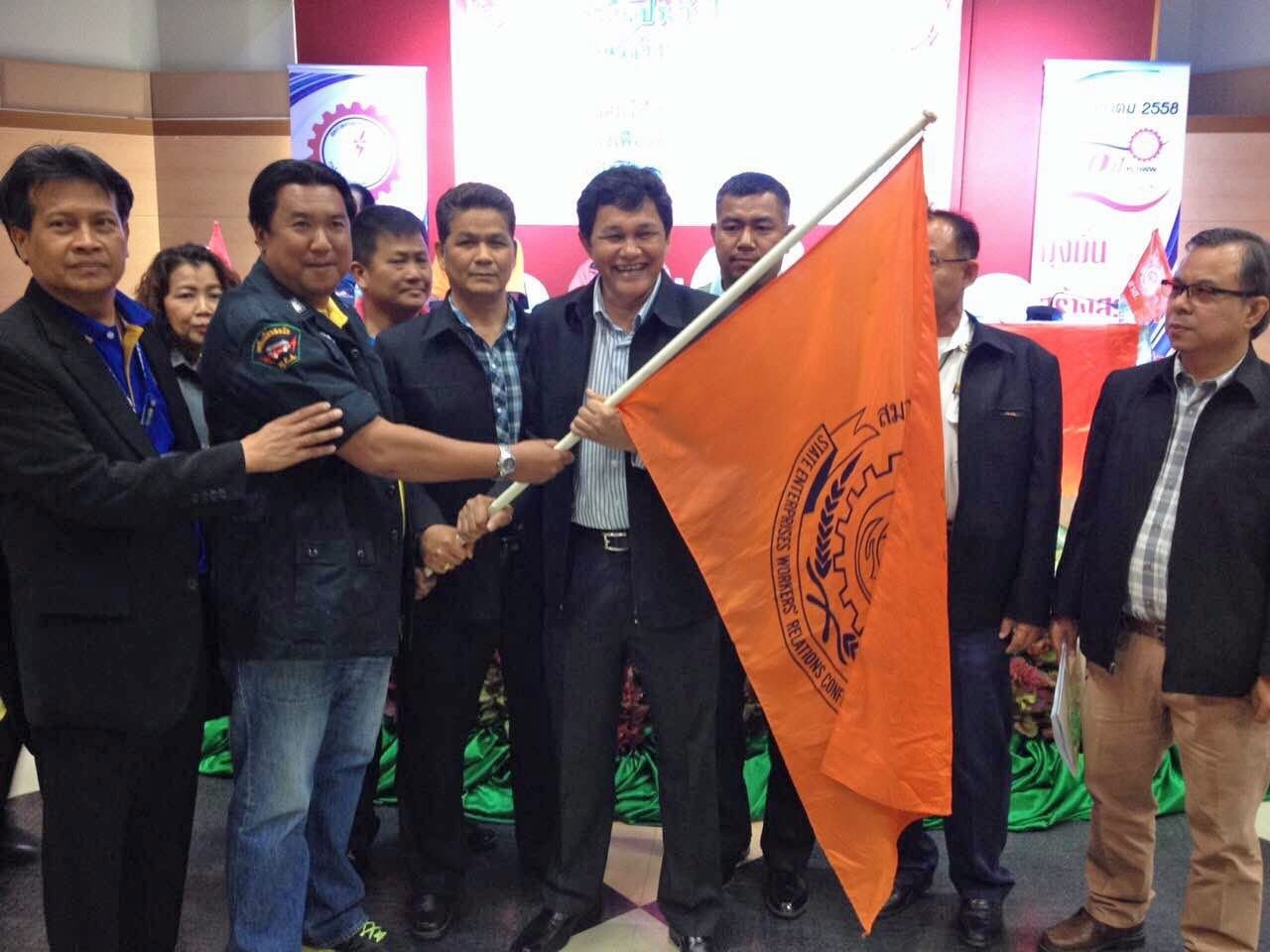
Oct 4, 2017
Public-sector employees in Thailand are stepping up their campaign to save jobs and hard-won benefits that would be lost if lawmakers approve a draft law privatizing state-owned companies.
Some 50,000 state enterprise workers will lose their jobs or transfer to companies with fewer benefits, and their collective bargaining process will also be at risk under the Public Holding Company Act, according to union leaders of the State Enterprises Workers’ Relations Confederation (SERC). SERC, a Solidarity Center ally and Thailand’s largest trade union organization, represents 180,000 members.
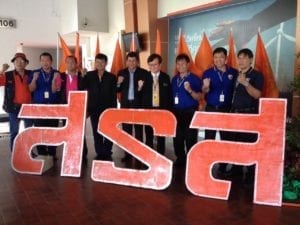
SERC leaders and members are challenging a proposed law that would deny public employees the right to form unions. Credit: Solidarity Center
The dynamic Thai union activist Sawit Kaewvarn last week was elected SERC general secretary by SERC’s Executive General Assembly and plans to take a strong stand to stop privatization of jobs. SERC also is concerned the draft bill may lead to exemption of several state enterprises under the State Enterprise Labor Relations Act (SELRA), effectively prohibiting workers’ legal rights to freedom of association and collective bargaining.
Last year after the bill was introduced, hundreds of SERC members gathered to petition the prime minister to express their disagreement with the bill, which they say could maximize profit-making at the expense of public services.
Kaewvarn also is president of Thai Labor Solidarity Committee (TLSC), which is campaigning for Thailand to ratify International Labor Organization (ILO) Convention 87 (freedom of association) and Convention 98 (right to organize and bargain collectively), and national labor law reform. Earlier this past summer, he mobilized TLSC members for a rally at the Ministry of Labor office in Bangkok to follow up on TLSC’s May Day demands, which include the ratification of the two conventions, a fair and living wage, implementation of occupational safety and health standards, effective allocation of safety and health funding, and enforcement of worker rights.
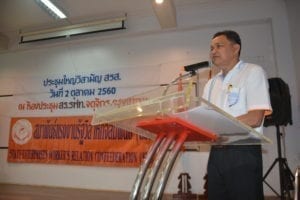
Sawit Kaewvarn was recently elected general secretary of SERC, a Solidarity Center ally and Thailand’s largest trade union organization. Credit: Solidarity Center
As TLSC president, Kaewvarn also is leading worker opposition to a Ministry of Labor proposal to expand the retirement benefit age from 55 to 60. Most workers in the private sector will be especially burdened, he says, because they must retire at age 55 and would struggle for five years before being entitled to the government-provided retirement benefit.
In June, Kaewvarn was elected general secretary of the State Railway Union of Thailand (SRUT). The election followed one last year in which the Ministry of Labor refused to register the results, which would have put Kaewvarn and his slate in office. Following a letter by the AFL-CIO to Thailand’s prime minister and Ministry of Labor urging the government to recognize the election results or order new elections, the government called for new elections in March and has now registered the results.
In 2009, Kaewvarn led Thai railway workers in a protest against unsafe working conditions, following a deadly train derailment. The State Railway of Thailand then dismissed several SRUT executive committee members, including Kaewvarn. Railway strikes are illegal in Thailand, a law the ILO says violates freedom of association. A National Human Rights Commission of Thailand found that the State Railway of Thailand violated freedom of association.

Sep 28, 2017
Kenyans going abroad to work as domestic workers will be required to have contracts, salaries and details of their work assignments before they leave, according to the (Kenya) Daily Nation.
The draft policy, crafted by the Labor Ministry and the Kenya Union of Domestic, Hotel, Educational Institutions, Hospitals and Allied Workers (KUDHEIHA), is part of KUDEIHA’s ongoing efforts to advance the rights of domestic workers in Kenya and abroad. (See a photo essay on KUDHEIHA outreach in Mvita.)
In Kenya and elsewhere, unscrupulous labor brokers often will not show migrating workers their contracts until they are at the airport or bus station, and frequently, the contracts are written in Arabic or a language the workers cannot understand. When they arrive at their destination, the contracts and promised salaries may even change.
“If approved, the policy takes a good first step in addressing the abuse and hardship many migrant domestic workers endure, problems exacerbated by their isolated work environments in employers’ homes,” says Hanad Mohamud, Solidarity Center Kenya country director. “But unless the policy is enforced, domestic workers, the majority of whom are women, will continue to be deceived about their wages, working conditions and terms of employment.”
In a recent series of Solidarity Center interviews, women who migrated from Mombasa to Saudi Arabia for jobs described their experiences, which included physical and verbal abuse, nonpayment of wages, inhumane sleeping conditions and 18-hour days with no days off.
Reaching out to Domestic Workers Migrating for Jobs
Over the summer, KUDHEIHA, a Solidarity Center partner, joined with allies in hosting a series of public informational forums throughout the Mombasa area on migrant worker rights. Local migrant worker and anti-human trafficking organizations, TRACE Kenya, Haki Africa and the Kenya National Commission on Human Rights helped support the events.
Although many workers in and around Mombasa travel abroad for jobs, primarily to Arab Gulf countries, customs or embarrassment may prevent them from sharing their experiences, and many residents do not have access to credible information on migration. As a result, communities are unaware of the hazards involved in migrating for work.
KUDHEIHA, which has long organized domestic workers throughout Kenya and has won national legislation improving domestic workers’ wages, benefits and working conditions, recently launched the campaign in Mombasa to reach domestic workers before they migrate and after they return.
KUDHEIHA also is pushing for enforcement of a law regulating labor agents, and working for laws that make it mandatory for informal economy employers to pay into the country’s social protection funds.
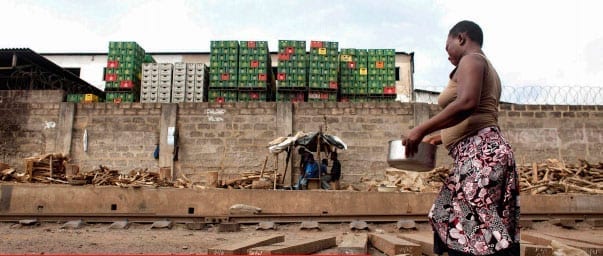
Sep 26, 2017
In the photo, a Ghanaian street vendor sells her wares in front of a massive multinational brewing company.
Guess who pays more in taxes?
The image, an ActionAid photo, shows the inequity of an impoverished vendor paying more in taxes than a major multinational, and makes concrete the reality of illicit financial flows for millions of Africans.
Africa loses at least $50 billion annually, likely much more, through illicit financial outflows, an amount equal to the development assistance it receives each year. Meanwhile, the number of people living on less than $1.25 a day is estimated to have increased from 290 million in 1990 to 414 million in 2010, according to a report commissioned by former South African President Thabo Mbeki. The report defines illicit financial flows as “money illegally earned, transferred or used.” The definition also encompasses the socially undesirable, such as the multinational corporate tax avoidance.
“The problem with IFFs in Africa is that money flows out of Africa and it never flows back,” says Luckystar Miyandazi, policy officer in the African Institutions Program at the European Center for Development Policy Management (ECDPM).
“When illicit financial flows happen, especially in Africa, there is a deficit of taxes,” she says. “Governments find ways of raising this money because they still need money to run, so that means increases in basic goods and services. [Higher] taxes on food, milk and so on affects workers, the community.”
Such regressive tax policies disproportionately harm informal workers and people living in poverty—the majority of whom are women.
Africa Delegation Travels US to Discuss Illegal Financial Flows

“The nature of investment we see that comes to Africa drives the race to the bottom”—Joel Odigie
Miyandazi is part of a four-person Solidarity Center delegation to the United States this month seeking to shine a light on the massive, yet little recognized crisis of illegal financial flows. The group spoke Monday at a panel on the University of California, Berkeley campus, and at a session sponsored by the Congressional Black Caucus Foundation’s Africa Braintrust in Washington, D.C., on Friday.
“The nature of investment we see that comes to Africa drives the race to the bottom,” says Joel Odigie, a member of the delegation and coordinator of Human and Trade Union Rights at the International Trade Union Confederation-Africa (ITUC-Africa). “There’s an attraction for financial direct investment, and business asks for benefits and concessions,” including lower labor standards, which drives down opportunities for good jobs. The result, says Odigie, is increasing numbers of working poor. (Odigie also spoke on the ITUC’s Radio Labor.)
“Work is on behalf of dignity—if you work, you get out of poverty,” he says. Yet “so many persons are working, breaking their backs, but they’re still in poverty.”
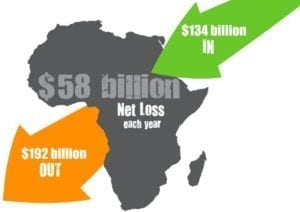 African trade unions and civil society organizations are leading this discussion and have responded with initiatives such as the launch of a transnational movement, Stop the Bleeding Africa, to educate around IFFs and mobilize citizens to advocate for corporate and government accountability.
African trade unions and civil society organizations are leading this discussion and have responded with initiatives such as the launch of a transnational movement, Stop the Bleeding Africa, to educate around IFFs and mobilize citizens to advocate for corporate and government accountability.
“For us the campaign around illicit financial flows is basically trying to make our members understand what the IFF is all about and bringing the message home—how this directly affects workers,” says Caroline Mugalla, executive secretary of the East Africa Trade Union Confederation (EATUC) and a delegation member. (Mugalla also spoke on the ITUC’s Radio Labor.)
Using Tanzania as an example, Mugalla says she points to the $4.8 billion Tanzania loses each year in illegal financial flows, and describes for people how that money could be used to improve the health delivery system and ensure children have access to education.
“Then people get it,” she says.
Going Forward
Mugalla says unions also are connecting with local government leaders to make the connection between the financial outflows and their struggle to provide basic services.
“A community has no water, no paved roads, no electricity—but the nearby mining company has it all,” she says.
When making tax policy, governments “need to take into account the people at the lowest level,” says Miyandazi. “For example, when a government gives a mining contract to a company and it’s going to displace people, governments should put people first and not multinationals.
The bottom line, says Miyandazi: “When making policy on Africa, Africa should be sitting at the table, part of the people who inform this policy and not be done by other people who think things should be done for Africa,” she says.
Gyekye Tanoh, team leader of the Policy Economy Unit at Third World Network Africa, also is taking part in the delegation.
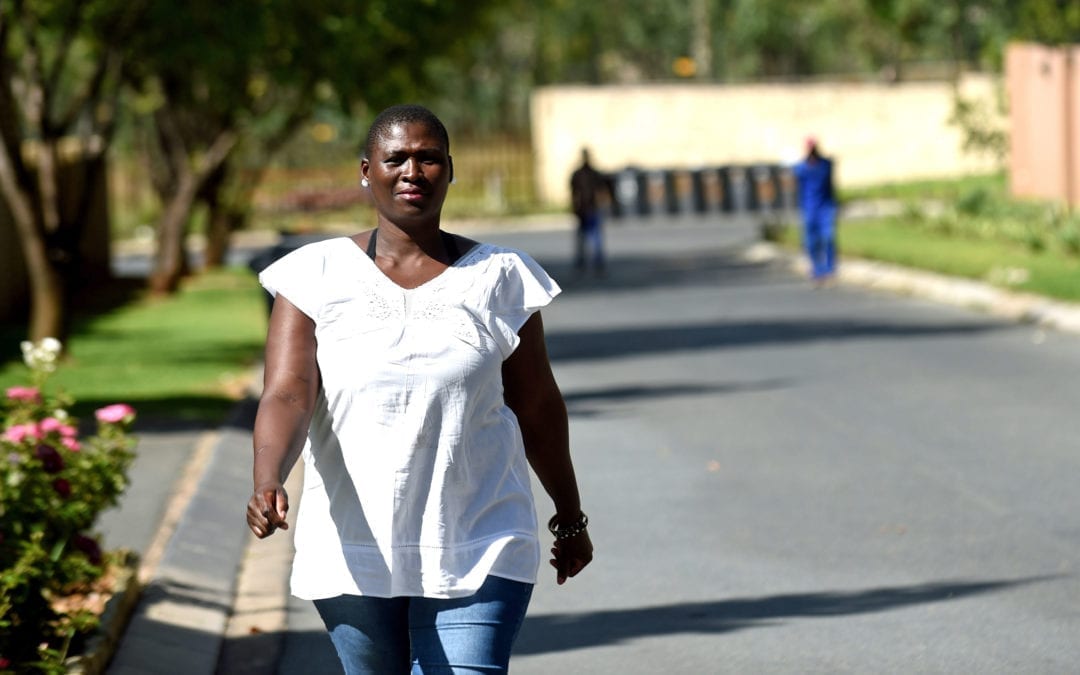
Sep 22, 2017
Prexedes, a domestic worker from Zimbabwe in South Africa, says migrant workers in South Africa often are paid lower wages and suffer harsher working conditions than their South African counterparts.
But after joining a union, Prexedes says she has a better salary, better working hours, weekends off and more.
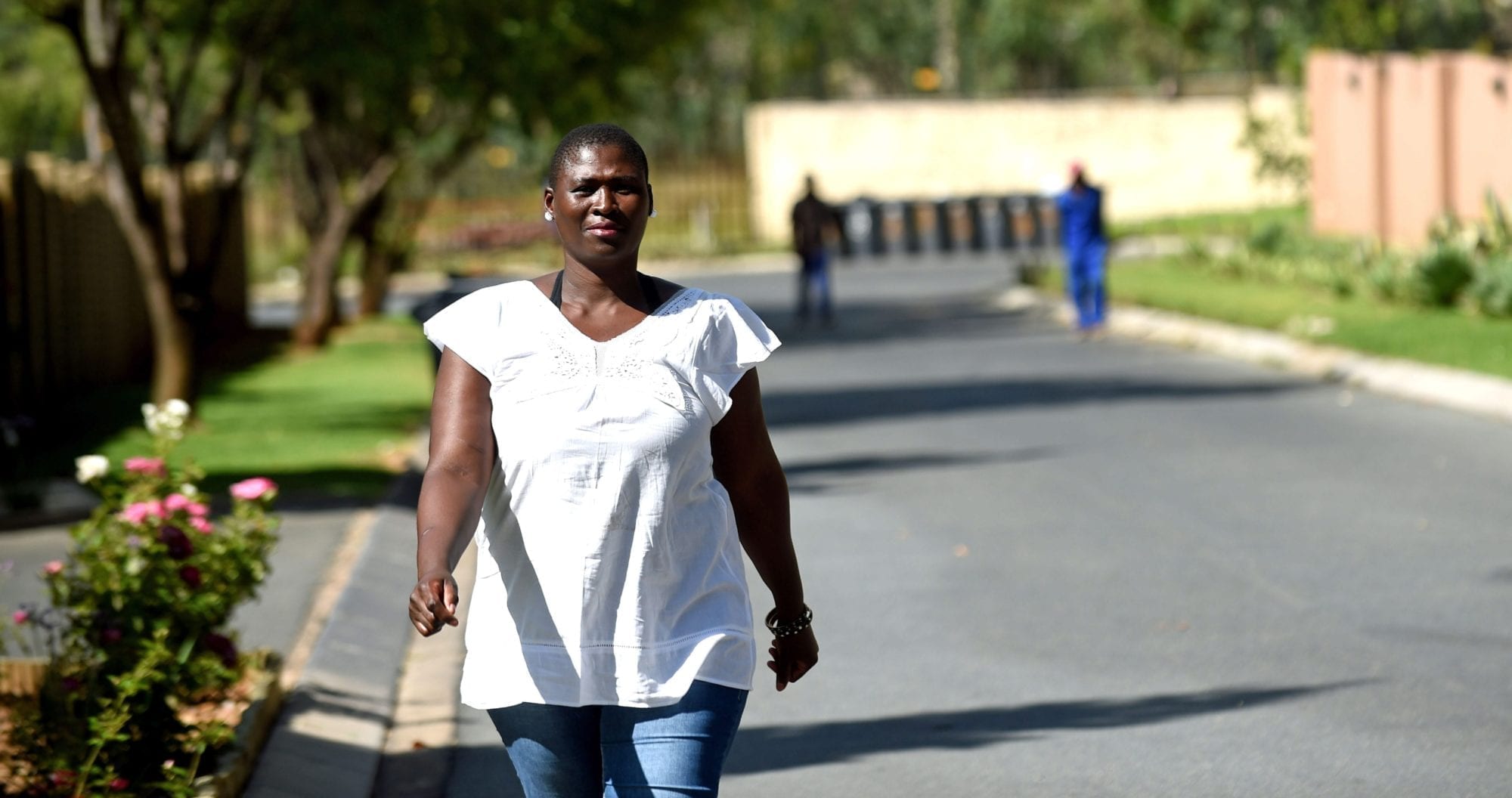
Sep 22, 2017
Prexedes, a domestic worker from Zimbabwe in South Africa, says migrant workers in South Africa often are paid lower wages and suffer harsher working conditions than their South African counterparts. Supporting her three children on her own, Prexedes struggled to pay for transportation to work and food for her family, and often worked overtime for no pay.
But now that she joined the South African Domestic Service and Allied Workers Union (SADSAWU), a Solidarity Center partner, she says “a lot has changed.”
“Since I have joined a union, my life has improved, with the hours I am working and the salary I am getting,” she says.





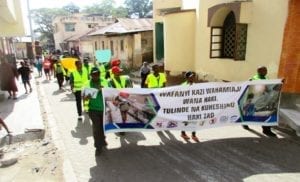


 African trade unions and civil society organizations are leading this discussion and have responded with initiatives such as the launch of a transnational movement,
African trade unions and civil society organizations are leading this discussion and have responded with initiatives such as the launch of a transnational movement, 
